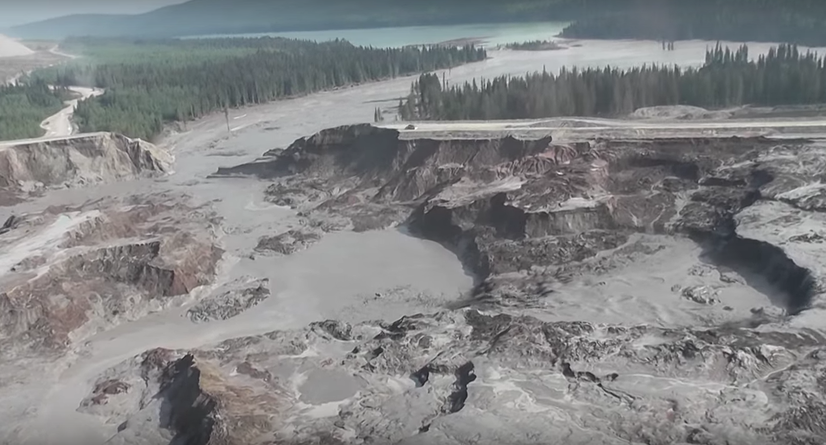This week marks the three-year anniversary of the Mount Polley mine disaster, which sent 24 million cubic metres of mining waste into Quesnel Lake, making it one of the worst environmental disasters in Canadian history.
It’ll be a stinging reminder of the tailings pond collapse for local residents, especially considering no charges have been laid against Imperial Metals, owner and operator of Mount Polley.
Come August 5 it will be too late for B.C. to lay charges, given a three-year statute of limitations — however federal charges can be laid for another two years.
But here’s the thing: under the federal Fisheries Act, Mount Polley can receive a maximum of $12 million in fines: $6 million for causing harm to fish and fish habitat and $6 million for dumping deleterious substances without a permit into fish bearing waters.
Compare that with the estimated $40 million in Mount Polley cleanup costs borne by B.C. taxpayers. And take into account that in 2016, Imperial Metals generated over $428 million in revenue and owns more than $1.5 billion in assets, according to the company’s annual report.
“Fines and sanctions are pitiful for environmental damages in Canada, and it’s part of the systemic and structural problem for ensuring greater environmental protection,” Ugo Lapointe, Canadian coordinator for MiningWatch, told DeSmog Canada.
“There’s little incentive for corporations to comply with environmental laws, or invest in more protective measures, if the consequences for failing to comply are cheaper.”
U.S. Environmental Fines Dwarf Canada’s
For examples of more meaningful environmental penalties, Canadians need look no further than the U.S.
In 2016 a Florida fertilizer manufacturer’s tailings pond drained millions of litres of wastewater into an underlying aquifer when a giant sinkhole appeared under the impoundment, tearing through the pond’s liner.
The company was fined $2 billion USD for improper waste and chemical management (that’s 167 times the maximum fine Mount Polley could face under the Fisheries Act).
In 2014, Alpha Natural Resources was ordered to pay $27.5 million USD for thousands of environmental violations at the company’s 79 coal mines and 25 processing plants across the States. The company was also ordered by the EPA to pay $200 million in upgrades to its facilities to avoid future infractions.
Meantime back in Canada, the largest fine in Canadian history for an environmental infraction was for $7.5 million.
That penalty was handed out in 2014 to owners of the Bloom Lake mine in Quebec who pled guilty to 45 separate charges under the Fisheries Act.
The second largest fine in Canada, at $4.4 million, was just handed out to Prairie Mines in Alberta for the release of 67 million cubic metres of tailings waste into two creeks that feed into the Athabasca River. That spill was nearly 40,000 times smaller than the Mount Polley disaster. Of that total, $3.5 million was paid in federal penalties, with the additional $900,000 paid in provincial fines.
The third largest fine of $3.4 million was handed out to Teck Metals for three offences under the Fisheries Act after the company released effluent into B.C.’s Columbia River.
Mount Polley Disaster Didn’t Change the Way Mining is Done in B.C.
The absence of provincial fines or charges in the wake of the Mount Polley mine spill worries Nikki Skuce, director of Northern Confluence, an initiative that aims to improve land-use decisions in B.C. watersheds.
“It just seems incredible for what is called the largest environmental disaster in B.C.’s history, there are no fines, no charges, no penalties,” Skuce told DeSmog Canada.
“Our laws are that weak.”
Further increasing concern is the fact best practices, including recommendations made by the Independent Expert Panel on Mount Polley, haven’t consistently been applied in the approval of new mines along the B.C./Alaska border.
Ten new mines are approved or under construction along the B.C.-Alberta border, including Imperial Metals’ Red Chris mine which was approved with a wet tailings pond impoundment similar in design to Mount Polley.
After the Mount Polley tailings spill, experts recommended the use of safer, but more costly, dry stack tailings.
“The Independent Expert Panel on Mount Polley concluded that we can expect two failures every decade if ‘business as usual continues,’ ” Skuce said, adding multiple wet tailings impoundments have been approved at mines of much greater scale than Mount Polley.
“With no full bonding requirements and potential fines low under B.C. and federal laws, companies have few incentives to invest in techniques like dry stacking that lower reclamation costs and reduce risk of spills,” Skuce said.
“Why use best practices and best available technology if you may never be held accountable if disaster strikes?”
Image: Mount Polley mine disaster. Photo: Cariboo Regional District via Youtube
Subscribe to our newsletter
Stay up to date with DeSmog news and alerts







